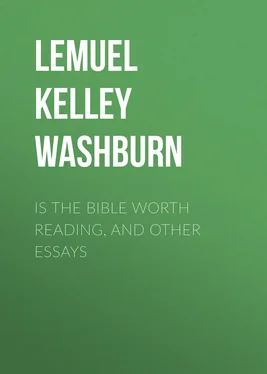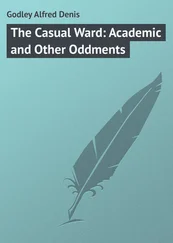Lemuel Kelley Washburn - Is The Bible Worth Reading, and Other Essays
Здесь есть возможность читать онлайн «Lemuel Kelley Washburn - Is The Bible Worth Reading, and Other Essays» — ознакомительный отрывок электронной книги совершенно бесплатно, а после прочтения отрывка купить полную версию. В некоторых случаях можно слушать аудио, скачать через торрент в формате fb2 и присутствует краткое содержание. Жанр: foreign_prose, foreign_religion, Философия, foreign_psychology, foreign_antique, на английском языке. Описание произведения, (предисловие) а так же отзывы посетителей доступны на портале библиотеки ЛибКат.
- Название:Is The Bible Worth Reading, and Other Essays
- Автор:
- Жанр:
- Год:неизвестен
- ISBN:нет данных
- Рейтинг книги:5 / 5. Голосов: 1
-
Избранное:Добавить в избранное
- Отзывы:
-
Ваша оценка:
- 100
- 1
- 2
- 3
- 4
- 5
Is The Bible Worth Reading, and Other Essays: краткое содержание, описание и аннотация
Предлагаем к чтению аннотацию, описание, краткое содержание или предисловие (зависит от того, что написал сам автор книги «Is The Bible Worth Reading, and Other Essays»). Если вы не нашли необходимую информацию о книге — напишите в комментариях, мы постараемся отыскать её.
Is The Bible Worth Reading, and Other Essays — читать онлайн ознакомительный отрывок
Ниже представлен текст книги, разбитый по страницам. Система сохранения места последней прочитанной страницы, позволяет с удобством читать онлайн бесплатно книгу «Is The Bible Worth Reading, and Other Essays», без необходимости каждый раз заново искать на чём Вы остановились. Поставьте закладку, и сможете в любой момент перейти на страницу, на которой закончили чтение.
Интервал:
Закладка:
Man builds a home for her he loves, he plants beside it all that will make it beautiful to the eyes of his wife. He works and brings what is fair to adorn it, and makes every room a casket to hold the jewel of love. He looks at his home with pride, and feels that it is “the dearest spot on earth,” a refuge safe and secure. The cyclone comes and in a moment all is swept away. Man cannot trust the God of the winds.
There is no more terrible calamity that afflicts our globe at the present time than an earthquake. It comes without warning, by day or night, when man is at his place of business or when he is at rest. There is no way of preventing it, no way of preparing for it. It may wait a hundred, a thousand, years before it works its deadly ruin. But when it comes, havoc is left. An earthquake may be good for the earth, but it is almighty discouraging to the people that live on it. It may seek a beneficent end, but it goes to work in a cruel manner to accomplish it. Human life counts no more than the life of rats when an earthquake gets started. This infernal visitor does not seek a spot where its malevolence can be wrecked upon the rocks and hills. Oftener it goes to the thickly populated city or town and topples over houses and swallows up dwellings, with men, women and children. Does God send the earthquake? If he does, where is the evidence of his love for man? If He does not, who does?
It is pretty tough business to try to reconcile Nature with the idea of God’s watchful care over man. If the winds did not turn to hurricanes; if the sunshine did not make drought; if the rain never became a flood; if the sea never grew angry and sunk the ship; if the clouds always dissolved in gentle rain or in dew; if there were no wild beasts; no venomous snakes; no poisonous vines or flowers; if there were only what is bright and fair and good on earth and nothing that was dark and cold and repulsive, we might believe that a heavenly father had made the earth for a dwelling-place for man. But as it is, we have to think as well of Nature as possible and dodge her lightning, run from her water-spouts, keep out of the way of cyclones and shift for ourselves while here. What follows nobody knows. It may be better for us beyond this life; we hope it is no worse. And it may be only sleep, sleep with no dreams and no awakening. We should dislike to die on this side of the grave with the fear that we should come out on the other only to meet a hurricane in the teeth, or find an earthquake had been put under us to give us a shaking up the first thing on that “shining shore,” or to be caught in a furious torrent that poured down the sides of some heavenly mountain. Earth is a pretty good place when the conditions are all favorable, but if we are to have another life it ought to be a better one or else we should be saved the trouble of dying.
‐‐‐‐‐‐‐‐‐‐‐‐‐‐‐‐‐‐‐‐‐‐‐‐‐‐‐‐‐‐‐‐‐‐‐‐‐
The feet of progress have always been shod by doubt.
‐‐‐‐‐‐‐‐‐‐‐‐‐‐‐‐‐‐‐‐‐‐‐‐‐‐‐‐‐‐‐‐‐‐‐‐‐
A true man will not join anything that in any way abridges his freedom or robs him of his rights.
THE INFINITE PURPOSE
A Christian writer recently said:—“The supreme duty of humanity is to get into touch with the infinite purpose.” This may be so, but we want first to understand just what the infinite purpose is before we subscribe to it. When the infinite purpose is bent on getting up an earthquake we do not care to “get into touch” with it, not much. When this purpose is forging an electric bolt to shoot out of the clouds, we have no desire to “get into touch” with any such thing. It makes a vast difference what this purpose is bent upon, whether or not we want to go into partnership with it. Now, when the infinite purpose is at work on the earth, turning dirt into flowers, or vegetables, or trees, we should feel a joy in sharing its labor, but when it is determined to burn and scorch everything on the face of the ground with a heat that knows no abatement, we should want to sell out our interest in the concern at once.
There is just as much nonsense connected with the use of this phrase “the infinite purpose” as there is with “special Providence” or “Divine love,” or any other religious expression which expresses nothing unless you are religious. Where this “purpose” “makes for righteousness,” as Matthew Arnold delighted to believe, we are willing to catch on to it, but where it is going in the other direction we prefer to go our own way.
This notion of uniting the finite with the infinite purpose is all right, providing the latter does not conflict with the former, but we have serious objection to doing anything that will interfere with the highest development of our humanity. The purpose which is at work in the world does not make for health any more than for disease. It seems to carry a tubercle with as much satisfaction as a ray of sunshine, and lends all its forces to assist the highwayman with no more charge than it makes to the law-abiding citizen.
It seems to us that it is necessary to divorce the “infinite purpose” from a lot of intentions that do not work for human interests, before it will be desirable to assume intimate relations with this purpose. We do not want to “get into touch” with what is not going our way; that is, the way of health, of prosperity, of happiness. We do not deny that we need to give a higher direction to human thought. We affirm this fact as positively as our most Christian contemporary. But before we advise mankind to harness its wagon to the infinite purpose we want to be sure where it is going. Man has to go to mill and market as well as to meeting, and there is just as good a purpose manifested in getting the most wholesome food for our stomachs as there is in getting the safest creed for our souls. We are loth to trust any religious purpose as opposed to a human one. We believe in man first, last, and all the time.
Now, let us admit that humanity needs a wiser purpose to guide it, but let us also admit that it can be found in a wiser human head and human heart. If what is called the infinite purpose is working for the highest end of human life, there is no evidence of the fact. If there is anything better than human energy back of a good human thought that will help this world, we do not know what it is.
‐‐‐‐‐‐‐‐‐‐‐‐‐‐‐‐‐‐‐‐‐‐‐‐‐‐‐‐‐‐‐‐‐‐‐‐‐
The man who accepts the faith of Calvin is miserable in proportion to the extent he carries it out.
‐‐‐‐‐‐‐‐‐‐‐‐‐‐‐‐‐‐‐‐‐‐‐‐‐‐‐‐‐‐‐‐‐‐‐‐‐
Whatever tends to prolong the existence of ignorance or to prevent the recognition of knowledge is dangerous to the well-being of the human race.
‐‐‐‐‐‐‐‐‐‐‐‐‐‐‐‐‐‐‐‐‐‐‐‐‐‐‐‐‐‐‐‐‐‐‐‐‐
A higher respect for man has been one of the chief promoters of civilization. Advancement has always been toward right and truth when the ranks were imbued with a proper regard for human hearts and human happiness.
FREETHOUGHT COMMANDS
Say nothing about others that you would not have others say about you.
Be severe toward yourself; be kind to your fellow-man.
Do not give advice that you cannot follow.
Do not thank God for what man does.
Serve neither God nor Mammon, but humanity alone.
Do not try to be perfect as a "Father in heaven," but try to be better than you yourself are.
Seek first to improve the earth, and heaven will be of less consequence.
‐‐‐‐‐‐‐‐‐‐‐‐‐‐‐‐‐‐‐‐‐‐‐‐‐‐‐‐‐‐‐‐‐‐‐‐‐
Читать дальшеИнтервал:
Закладка:
Похожие книги на «Is The Bible Worth Reading, and Other Essays»
Представляем Вашему вниманию похожие книги на «Is The Bible Worth Reading, and Other Essays» списком для выбора. Мы отобрали схожую по названию и смыслу литературу в надежде предоставить читателям больше вариантов отыскать новые, интересные, ещё непрочитанные произведения.
Обсуждение, отзывы о книге «Is The Bible Worth Reading, and Other Essays» и просто собственные мнения читателей. Оставьте ваши комментарии, напишите, что Вы думаете о произведении, его смысле или главных героях. Укажите что конкретно понравилось, а что нет, и почему Вы так считаете.












